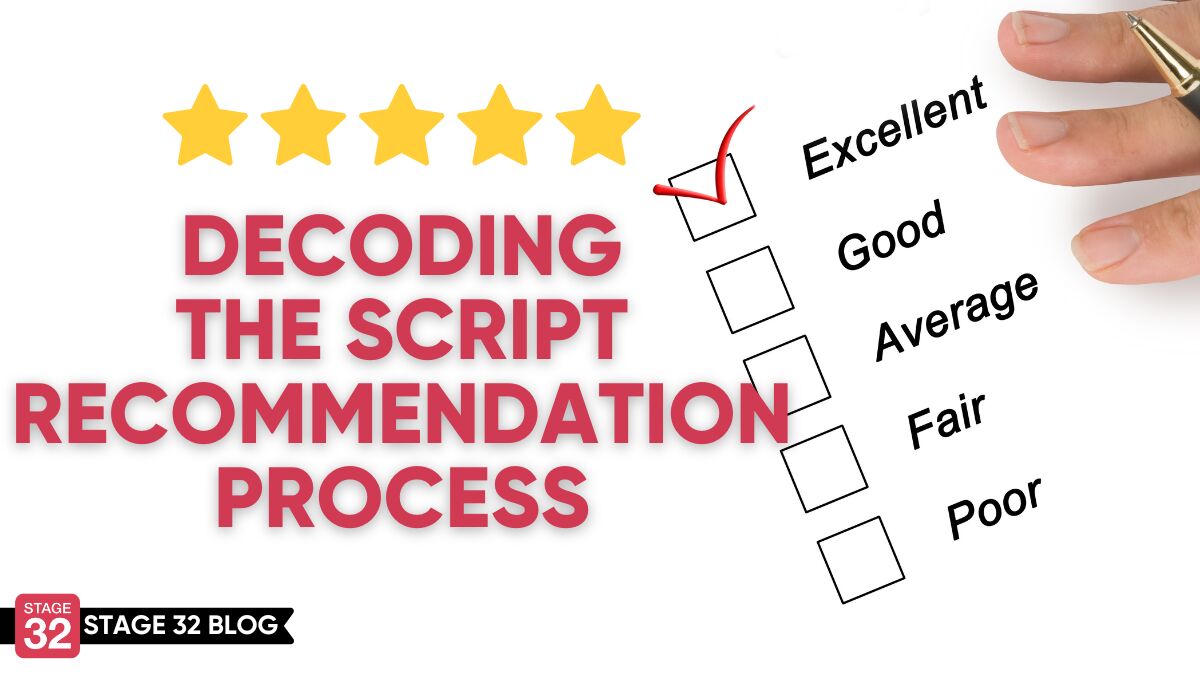Decoding The Script Recommendation Process
To wrap up my recent blog series on understanding script analysis and coverage, I'm delving into the inner workings of the recommendation process and exploring the factors that industry professionals consider when deciding which scripts to recommend. From the potential impact of a positive script recommendation on a writer's future in the industry to the significance of script grading as a deciding factor for acceptance or rejection, I aim to provide new screenwriters with a comprehensive understanding of this vital step in their journey.
A script recommendation serves as a key endorsement that can open doors. Imagine your script landing on the desk of a decision-maker. Your words and ideas, the characters and worlds you've created, all lie in wait for that crucial nod of approval. A recommendation from a respected industry professional not only validates your talent as a writer but also acts as a signal to others in the industry that your work is worth their time and investment.
As a new screenwriter searching for success in the industry, understanding the intricacies of the script recommendation process is crucial. This can lead to your script being read by influential producers, directors, and actors, dramatically increasing the chances of it being optioned or produced. In essence, a script recommendation is not merely a suggestion; it's a powerful catalyst that can ignite your career.

First Impressions: Your Script In The Industry
First impressions count, especially in the competitive screenwriting industry. When your script lands in the hands of a reader, it carries with it your reputation and potential. A strong first impression can set the tone for how your work is perceived and can influence whether industry professionals will advocate for your script. This initial judgment often dictates whether your script is swiftly passed on for further consideration or relegated to the pile of missed opportunities. Therefore, it is essential to ensure that your script is polished, formatted correctly, and embodies a story that is both engaging and marketable.
These gatekeepers are tasked with identifying scripts with the potential to succeed in a market that demands both quality and originality. They scrutinize every aspect of your work, from the strength of the opening pages to the depth of character development and the structure of the plot.
The goal is to unearth scripts that possess a unique voice and offer audiences something they haven't seen before. A recommendation often hinges on the reader's ability to envision the script transitioning from page to screen. They consider factors like the potential audience, market trends, and production viability. When a script is recommended, it signifies a belief in its value and a vision for its success.

How Do Professionals Decide On A Script?
Professionals in the industry decide on a script by looking for certain key elements that indicate its potential for success. The primary factor is the script's overall quality, including its narrative structure, dialogue, and character development. In addition to quality, professionals consider the script's marketability.
They ask questions like:
- Is there an audience for this story?
- Does it fit within a popular genre or does it offer a fresh perspective?
- Does the story flow logically?
- Are the characters engaging and well-defined?
- Is the dialogue natural and does it move the story forward?
They also evaluate the script's potential to attract talent. A strong role could pique the interest of a reputable actor or director, which can be integral to getting a project off the ground. Lastly, timing can play a role. Industry trends and current events can affect a script's relevance and urgency in the market. Professionals weigh all these factors when deciding to recommend a script.
The Criteria For Recommendation
The criteria for recommending a script are both specific and universal. Industry professionals seek originality above all—scripts that offer new stories or unique takes on familiar themes stand out. The plot must be compelling and maintain the reader's interest from start to finish. High stakes, clear conflict, and a satisfying resolution are key components of a recommendable script. Characters are the heart of any story, so they must be well-developed and multi-dimensional. Readers and potential backers look for characters who evoke empathy and undergo significant growth throughout the narrative.
Professionals also assess the script's dialogue for authenticity and its ability to advance the plot or reveal character. Additionally, the script's format and style are scrutinized to ensure they meet industry standards, as deviations can be a sign of inexperience. Ultimately, the script must demonstrate feasibility for production, including reasonable budget requirements and potential for commercial success. It's these criteria that guide professionals in deciding whether to champion a script within the industry.

The Influence Of A Positive Script Recommendation
A positive script recommendation can be a game-changer for a screenwriter. It's akin to a seal of approval that echoes through the corridors of the film industry. Such a nod can amplify your script's visibility, getting it into the hands of influential decision-makers who have the power to greenlight projects. It's not just about getting your script produced; it's about building relationships and establishing a reputation. A single recommendation can lead to meetings with agents, development deals, or writing assignments. Producers and executives remember writers who have impressed them, leading to future opportunities for collaboration. It's not just about a single project; it's about opening the door to a career with multiple projects across various genres.
The confidence boost from a recommendation isn't to be overlooked either. It affirms your skills and can embolden you to take greater creative risks, pushing your writing to new heights.
Handling Constructive Criticism: Turning Rejection Into Success
Dealing with rejection is a part of every screenwriter's journey, but it's not the end of the road—it's a potential turning point. Constructive criticism that often accompanies a rejection can be a valuable tool for growth. It provides insights into areas of your script that may need refinement. Instead of viewing rejection as a setback, consider it an opportunity to hone your craft.
Take the feedback and use it to improve your script. Sometimes, a fresh perspective can reveal gaps you didn't see and inspire new ideas that elevate your story. Remember, many successful screenwriters faced rejection before achieving success. Resilience and the willingness to learn from criticism can distinguish between those who give up and those who eventually break through. Embrace the feedback, refine your work, and keep submitting.
The topic of rejection is something that Stage 32 CEO RB Botto recently shared his thoughts on. You can find that HERE.

Breaking Down Script Grading
Script grading is an essential element in the recommendation process. It acts as a standardized method for evaluating the quality of a screenplay. Just as students are graded on their academic work, screenplays are graded to assess their potential.
A high grade can signify that a script is ready for production, while a lower grade can indicate that further development is needed. This grading system is used by script coverage services, competitions, and sometimes even within studios or production companies to quickly communicate a script's strengths and weaknesses. It allows industry professionals to make informed decisions and prioritize which scripts to read and consider further.
Moreover, script grading can provide vital feedback for screenwriters, offering a clear idea of where their script stands in the competitive marketplace. It's not just a measure of a script's present state but a guideline for its potential trajectory.
What Elements Make A Script Score High?
A high-scoring script is one that excels in several key areas:
- It must have a clear and compelling premise that captures the reader's interest from the outset.
- A strong structure is also crucial; the script should have a defined beginning, middle, and end with plot points that keep the story moving forward.
- Characters should be well-developed and have distinct voices, with clear arcs that show growth or change.
- Dialogue must feel natural and serve the story, revealing character or advancing the plot without being on-the-nose.
- Originality can set a script apart, offering a fresh take on a genre or a perspective not typically seen on screen.
- Good pace, maintaining engagement and tension throughout.
- Proper formatting, spelling, and grammar show attention to detail and professionalism. Industry-standard script formatting ensures that your work is taken seriously and is easy for readers to follow.
- The title page should be clean and professional, providing only the necessary information: the title of your screenplay, your name, and contact information.
- Brevity is your ally! Avoid overly lengthy descriptions, focusing instead on clear, visual storytelling that allows the reader to see the film in their mind's eye.
A script that scores high in these areas has a significantly better chance of being recommended!
Common Pitfalls to Avoid
Similarly, some scripts fail to make the grade due to common, avoidable mistakes:
- Lack of originality; if a script feels too derivative or clichéd, it fails to stand out in a crowded market.
- If the story meanders without clear direction or purpose, it loses the reader's interest.
- Characters must be more than just names on a page; they need depth, motivations, and conflicts that resonate with readers and viewers.
- Dialogue that is unnatural or expository can detract from a script's quality.
- Production feasibility; scripts that require excessively large budgets or have impractical production demands often face rejection.

Polishing Your Script For The Top Spot
I covered this topic in more detail in my last blog, but let's quickly review why polishing your script is a crucial step toward securing the top spot in a pile of screenplays.
A polished script is tight, well-paced, and free from filler. Every scene should be necessary and move the story forward, while every line of dialogue should reveal character or advance the plot. Continually revise and refine your script to enhance clarity and impact. This may involve tightening the action, deepening character arcs, or elevating the central conflict. Feedback from trusted colleagues or industry professionals can pinpoint areas that may need more work.
Attention to the finer details of your script is also critical. This includes checking for typos, ensuring correct formatting, and trimming excess words that don't serve the story.
The aim is to present a script that reads smoothly and immerses the reader in your cinematic vision. A meticulously polished script not only reads better but also demonstrates your commitment to your craft and respect for the reader's time. It's these polished scripts that rise to the top.
Your Success Story: The Next Recommended Script Could Be Yours
Your journey as a screenwriter is unique, and your success story is likely yet to be written. The next script to receive a glowing recommendation, the one that captures the attention of the industry and audiences alike, could very well be yours.
To reach this goal, keep refining your craft, be open to feedback, and stay true to your vision. Remember, every successful screenwriter started where you are now. They faced challenges and overcame them through determination and passion for storytelling. Your ability to persevere, to learn from each experience, and to continue writing, will set you apart. Each no brings you closer to the yes that will change your career.
So stay optimistic and keep pushing forward. Continue to write, submit, and network. Understand that every script is an opportunity to improve and learn. Engage with the writing community, attend workshops, and never stop studying the craft of screenwriting. By embracing the process with patience and persistence, you're not just waiting for success; you're actively working towards it. Every step you take is building the foundation for a successful screenwriting career.
Your next script could be the start of an exciting new chapter.
If you'd like to read Miquiel's previous blogs in this series, you can find them below:
Script Analysis 101: Understanding The Key Elements That Make Or Break A Screenplay
Script Coverage 101: A Guide For Entry-Level Screenwriters
Is Script Coverage Worth The Investment?
Unveiling The Secrets Of Script Analysis
10 Tips To Scrutinize Your Script Before Submitting
Let's hear your thoughts in the comments below!
Got an idea for a post? Or have you collaborated with Stage 32 members to create a project? We'd love to hear about it. Email Emily at blog@stage32.com and let's get your post published!
Please help support your fellow Stage 32ers by sharing this on social. Check out the social media buttons at the top to share on Instagram @stage32 Twitter @stage32 Facebook @stage32 and LinkedIn @stage-32
| How The Hero's Journey Became The Guiding Force In Disney Animation |
| Sandstone Artists Signs Writer Discovered On Stage 32 |
Search Stage 32 Blog
There are now 4042 blog posts for you to enjoy. Search them all by tags below.
Acting, Advice, Cinematography, Coffee & Content, Composing, Contests, Distribution, Featured, Filmmaking, Financing, Inspirational, Networking, Producing, Screenwriting, Success Stories, Tips, Trending,Relevant Tags
Recommended Articles

My Stage 32 Story: Persistence, Healing, & Creative Breakthroughs in Year 3

Stage 32 Certification Featured In IndieWire!

Forbes Spotlights Stage 32 Certification!

Happy Thanksgiving From Stage 32: We Are Thankful For YOU

November Write Club Week 4: The Art of the Pitch- What Managers & Execs Actually Want to Hear

Stage 32 Featured at the 43rd Torino Film Festival!

Coffee & Content: Why Your Pitch Needs to Be Human

Green Lights and Grey Areas: Expanding Creative Collaboration in Publishing

Insider Intel: The Studio War & The Rise of Indies






